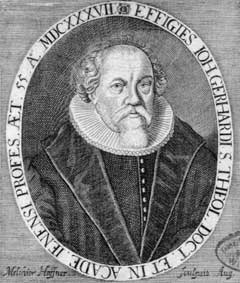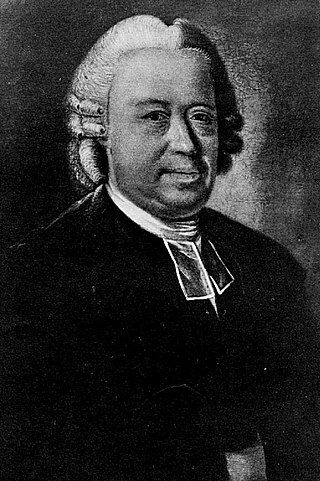
Johann Ernst Immanuel Walch (29 August 1725 – 1 December 1778) was a German theologian, linguist, and naturalist from Jena.

Johann Ernst Immanuel Walch (29 August 1725 – 1 December 1778) was a German theologian, linguist, and naturalist from Jena.
The son of the theologian Johann Georg Walch, he studied Semitic languages at the University of Jena, and also natural science and mathematics. In 1749 he published Einleitung in die Harmonie der Evangelien, and in 1750 was appointed professor extraordinarius of theology. Five years later he became professor ordinarius of logic and metaphysics; in 1759 he exchanged this for a professorship of rhetoric and poetry. [1]
Amongst his theological works were Dissertationes in Acta Apostolorum (1756–1761); Antiquitales symbolicae (1772); and after his death appeared Observationes in Matthaeum ex Graecis inscriptionibus (1779). He also edited a periodical Der Naturforscher (1774–1778), and during the years 1749-1756 took an active part in editing the Zeitungen von gelehrten Sachen. [1]
"Most of Walch’s interests and publications were on topics in the humanities. These included early Christian church history; New Testament exegesis and commentary; Latin and Greek linguistics, literature, and inscriptions; Roman history and antiquities; Celtic religion; and the history of medicine."
— Kihm & St. John [2] , 2007, p117
In the later part of his career Walch found interest in the natural sciences, particularly fossils and geology. [2] One significant result was the beautifully illustrated, four-volume Die Naturgeschichte der Versteinerungen ("The Natural History of Petrifactions"), released from 1768 to 1773, and also published in French and Dutch editions. A comprehensive chapter on trilobites in 1771 contains the first use of the word "trilobite" and predates other equally comprehensive treatments by 50 years. [2]
"By the end of his career, he had completed over 80 publications (books, chapters, and articles) on various topics in the humanities and about 50 publications in natural history. He became ill in Summer 1778 with the onset of hypochondriac (abdominal) seizures... his death on December 1, 1778, [was] from intestinal infections."
— Kihm & St. John [2] , 2007, p. 117
Walch died in Jena. His brother Christian Wilhelm Franz Walch was also theologian.

Johann Matthias Gesner was a German classical scholar and schoolmaster.

Johann Augustus Eberhard was a German theologian and "popular philosopher".

Johann Georg Walch was a German Lutheran theologian.

Johannes Gerhard was a Lutheran church leader and Lutheran Scholastic theologian during the period of Orthodoxy.

The University of Jena, officially the Friedrich Schiller University Jena, is a public research university located in Jena, Thuringia, Germany.

Johann Reinhold Forster was a German Reformed (Calvinist) pastor and naturalist who made contributions to the early ornithology of Europe and North America. He is best known as the naturalist on James Cook's second Pacific voyage, where he was accompanied by his son Georg Forster. These expeditions promoted the career of Johann Reinhold Forster and the findings became the bedrock of colonial professionalism and helped set the stage for the future development of anthropology and ethnology. They also laid the framework for general concern about the impact that alteration of the physical environment for European economic expansion would have on exotic societies.
Gottfried Achenwall was a German philosopher, historian, economist, jurist and statistician. He is counted among the inventors of statistics.

Johann Franz Buddeus or Budde was a German Lutheran theologian and philosopher.

Johann Christoph Döderlein or Doederlein was a German Protestant theologian.

Johann Georg Specht was born in Lindenberg im Allgäu. He was a civil engineer and architect in the south of Germany.

Johann Traugott Leberecht Danz was a German Lutheran theologian and church historian born in Weimar.

Johann Melchior Goeze was a Lutheran pastor and theologian during the period of Late Orthodoxy. From 1760 to 1770 he served as senior of Hamburg presiding as spiritual leader over the Lutheran state church of the city-state.

Johann Samuel Schröter was a German Protestant pastor since 1763, who was also a conchologist, mineralogist and palaeontologist. He was a member of the Academy of Sciences Leopoldina.

Christian Wilhelm Franz Walch was a protestant German theologian and professor of theology from Göttingen. He authored numerous books.

Johann Georg Liebknecht was a German theologian and scientist. He was professor of mathematics and theology at the Ludoviciana (University) in Giessen, Germany.
Georg Ludwig Walch was a German classical philologist largely known for his edition and analysis of works by the Roman historian Tacitus. He was the grandson of theologian Johann Georg Walch (1693–1775).

Georg Joachim Zollikofer was a Swiss-German theologian who popularized Enlightenment theology, and published several books of sermons and hymns.

Johann Friedrich Kleuker was a German Protestant theologian and University professor.
Karl Friedrich Walch was a German legal scholar.

Johann Jakob Pfeiffer was a German evangelical theologian, as well as a professor, and later, dean, at the University of Marburg.